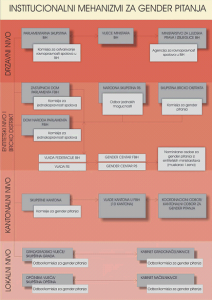 The Law of Gender Equality in Bosnia and Herzegovina has established the Agency for Gender Equality of Bosnia and Herzegovina and the gender centres (Gender Centre of the Federation of Bosnia and Herzegovina and Gender Centre- Gender Equality Centre of the Government of Republika Srpska) which exist on the entity level. The Agency and the entity gender centres are public institutions i.e. governmental bodies.
The Law of Gender Equality in Bosnia and Herzegovina has established the Agency for Gender Equality of Bosnia and Herzegovina and the gender centres (Gender Centre of the Federation of Bosnia and Herzegovina and Gender Centre- Gender Equality Centre of the Government of Republika Srpska) which exist on the entity level. The Agency and the entity gender centres are public institutions i.e. governmental bodies.
Additionally the Law has obliged all governments at all levels of authority in Bosnia and Herzegovina to:
“establish adequate institutional mechanism for equality that shall implement the Law on Gender Equality in Bosnia and Herzegovina, coordinate realisation of programmatic goals from the Gender Action Plan of Bosnia and Herzegovina and ensure implementation of international standards in gender equality area.“
Today institutional mechanism on gender equality form a network which includes institutions on the municipal, cantonal, entity and state level both in the executive and the legislature. At the state level there is a Commission for Gender Equality of the Parliamentary Assembly of BaH, and at the entity level there are Commissions for Gender Equality of the House of Peoples and the House of Representatives of the Parliament of the Federation of BaH, and the Equal Opportunities Committee of the National Assembly of Republika Srpska. Cantonal Assemblies in the Federation of BaH have established Committees for Gender Equality. At the local level there are committees within municipal assemblies in almost all municipalities across BaH
All institutional mechanisms have precisely defined mandate, which shows governments’ commitment to achieve gender equality and inclusion of gender issue in all segments of social life. Yet, the Agency and the entity Gender Centres represent the real drivers of the initiatives and measures, and the key implementers and monitors of the gender mainstreaming in BiH. These three institutional mechanisms for gender equality are crucial instrument in initiating and implementing activities in the area of gender equality. They have the prominent place considering their activities, projects and measures which they have undertaken to strengthen and ensure sustainability of institutional mechanisms for gender equality, as well as to initiate establishment of such mechanisms at the local level.